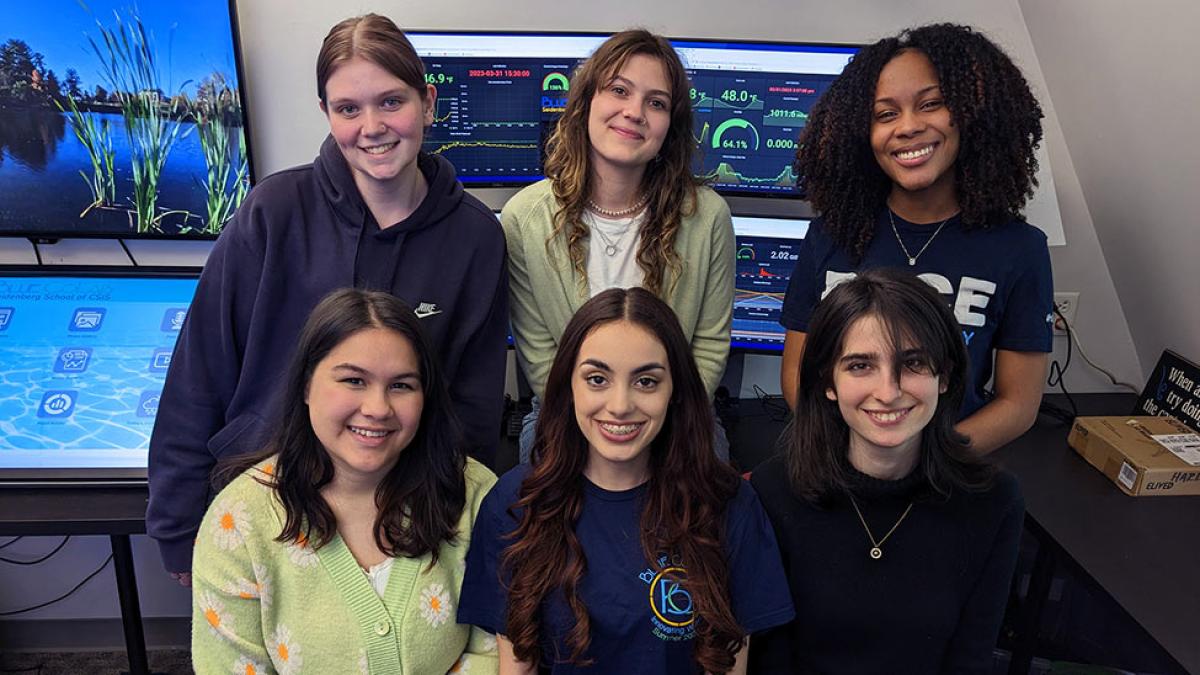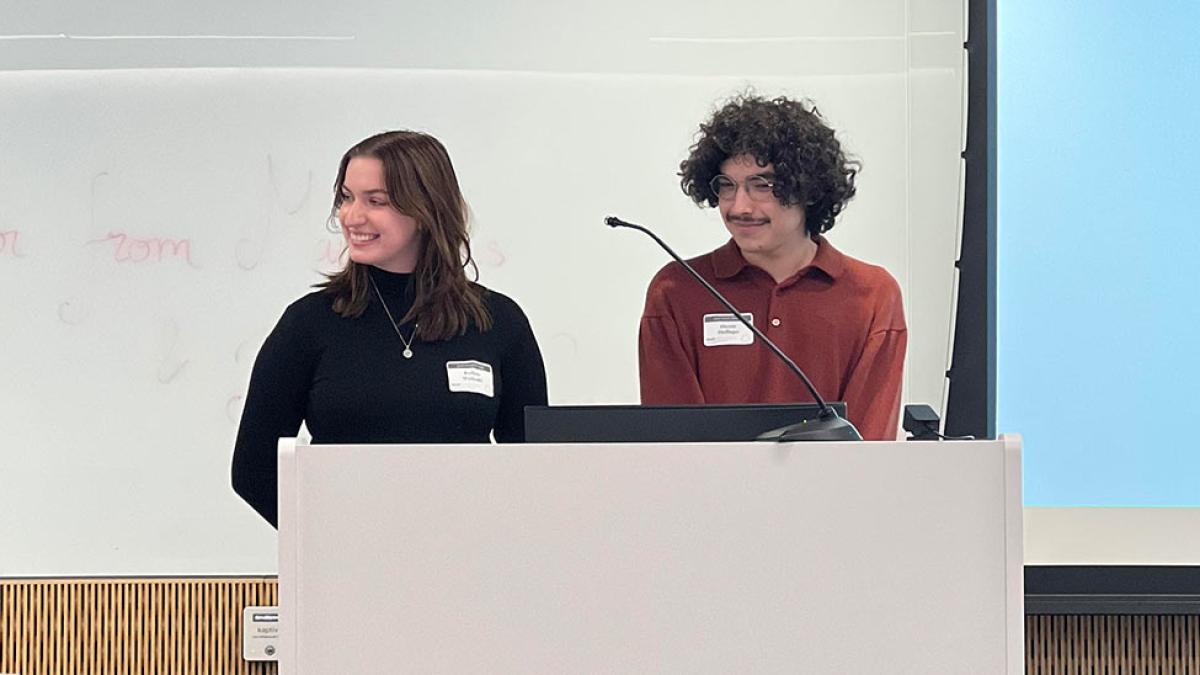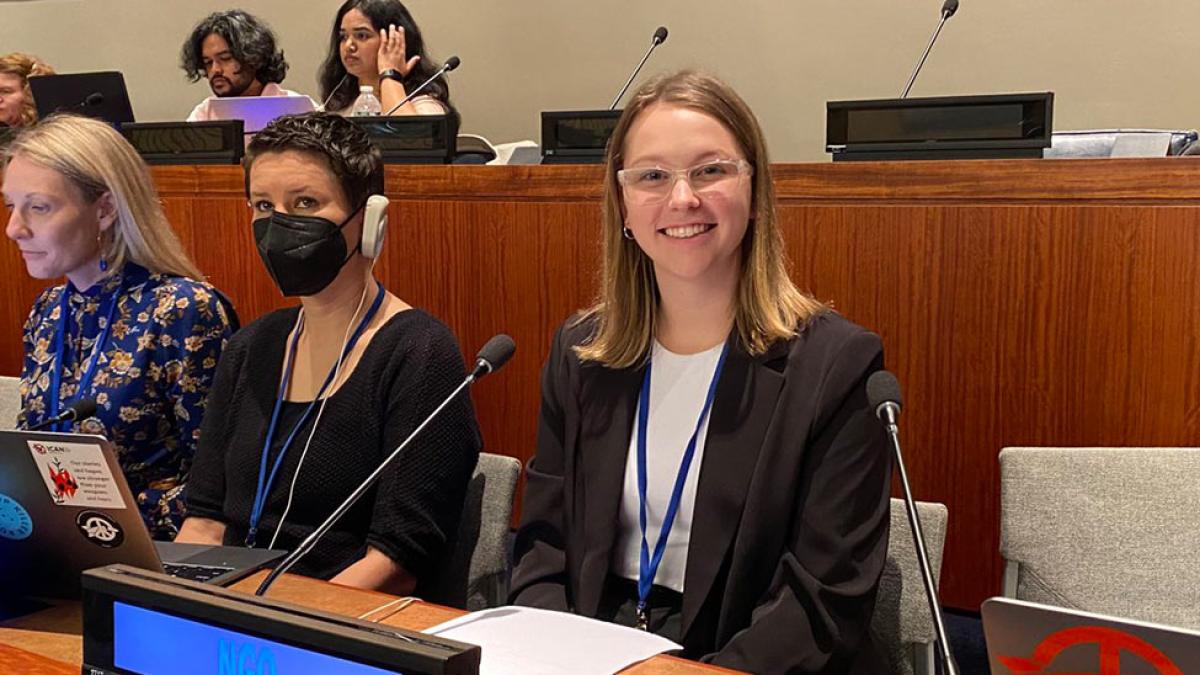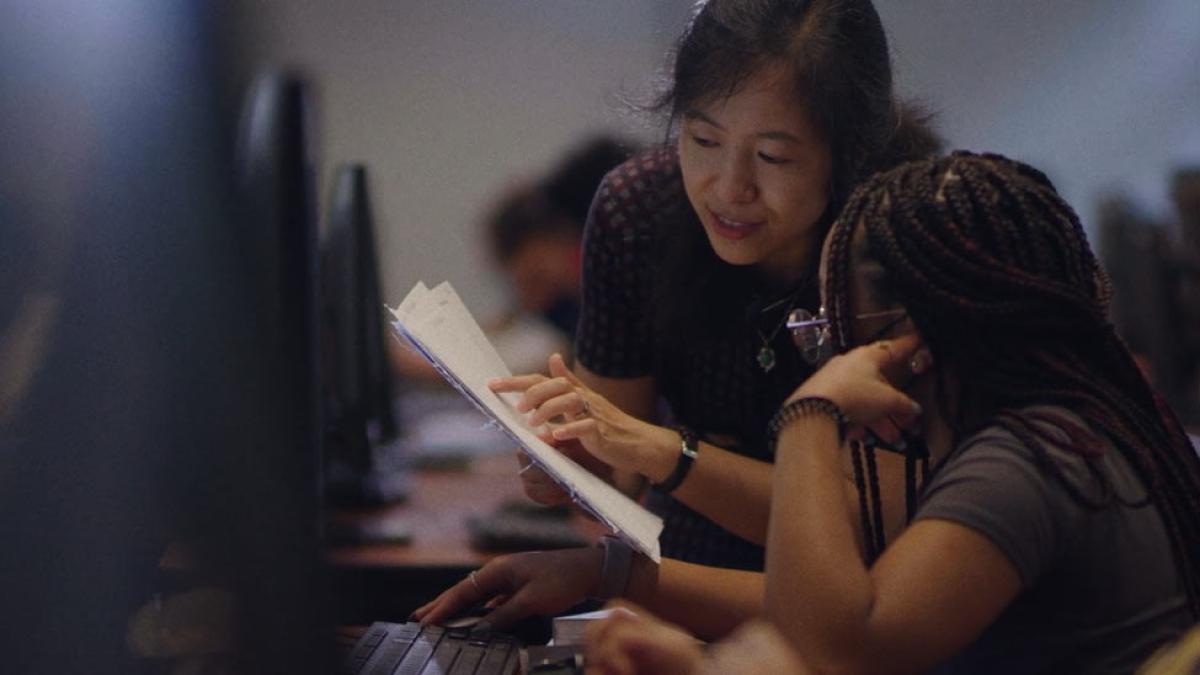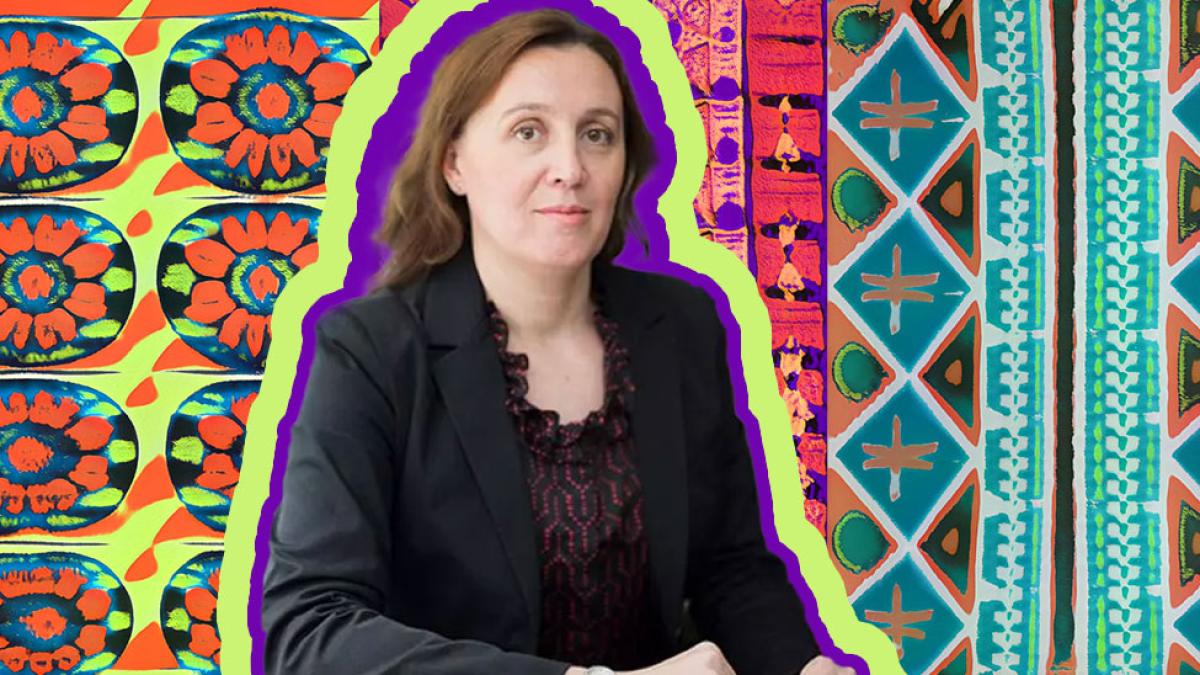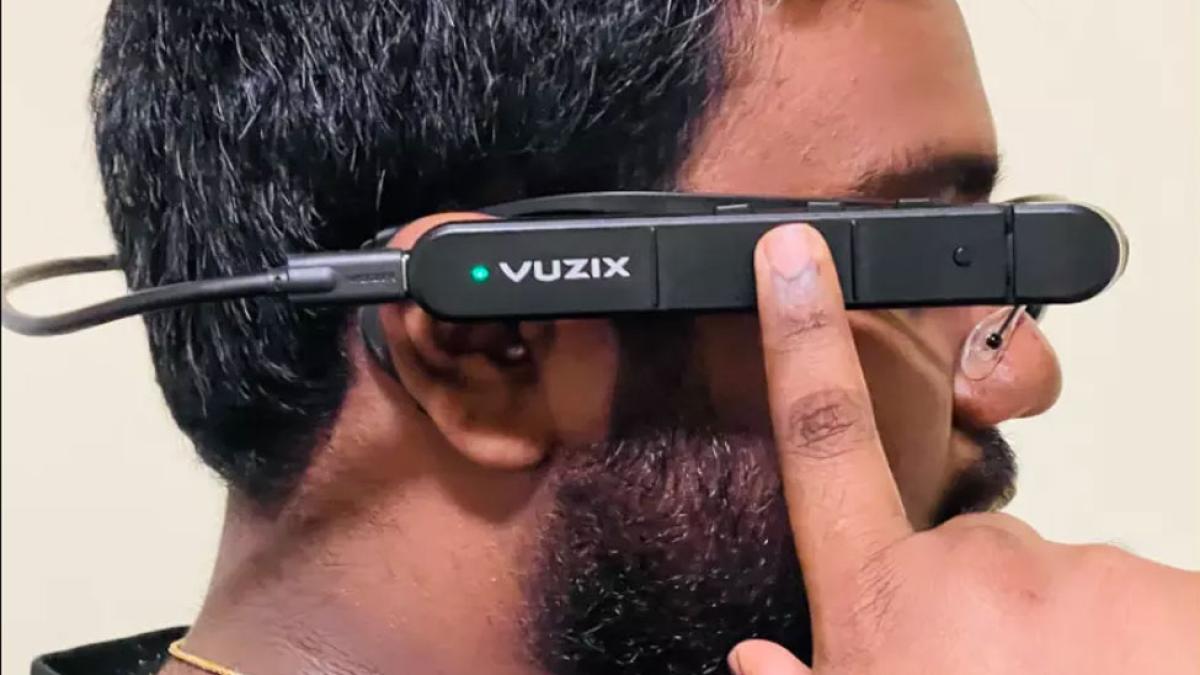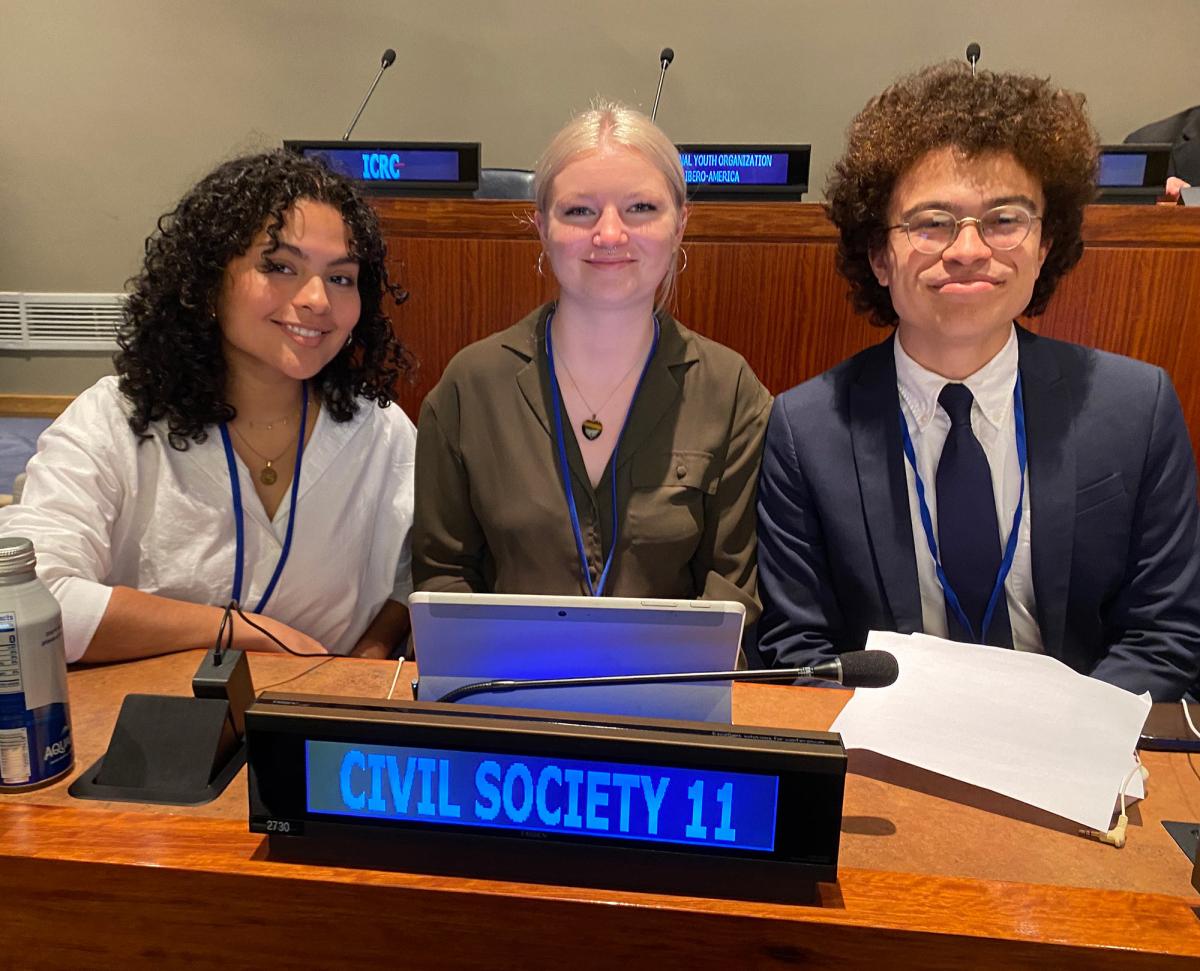
2023 Power Players in Education
Pace President Marvin Krislov for making the Politics NY 2023 Power Players in Education list.
Marvin Krislov has served as president of Pace University since 2017. He is deeply committed to Pace’s mission of Opportunitas: providing all students, regardless of economic background, access to the transformative power of education. Under his leadership, Pace is developing innovative new interdisciplinary programs, continuing the transformation of its New York City Campus, and delivering on its experiential education model, the Pace Path, that produces superior career outcomes.
Three Dyson Students Deliver Statements to the UN General Assembly First Committee
On Wednesday, October 11, Political Science and Peace and Justice Studies students Ellis Clay ‘25, Antje Hipkins ’24, and Jasmine Cintron Soto ’25 delivered statements to the United Nations General Assembly First Committee, a forum focused on global disarmament and international security.
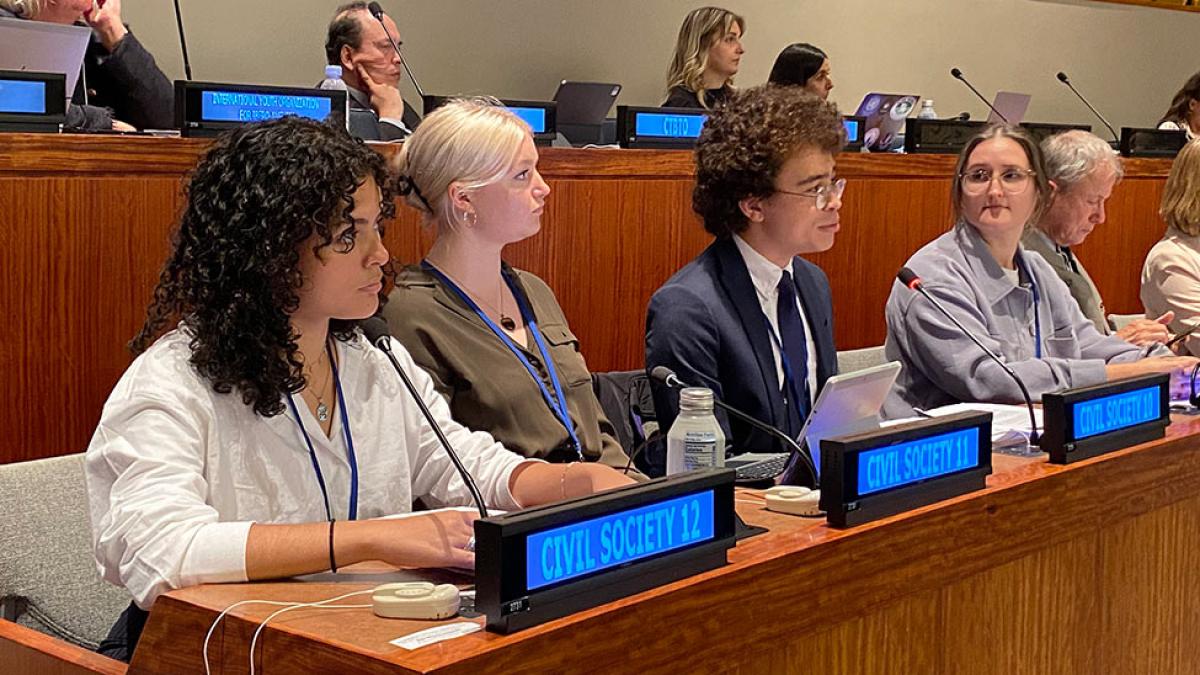
On Wednesday, October 11, Political Science and Peace and Justice Studies students Ellis Clay ‘25, Antje Hipkins ’24, and Jasmine Cintrón Soto ’25 delivered statements to the United Nations General Assembly First Committee, a forum focused on global disarmament and international security.
Clay, Hipkins, and Cintrón Soto are interns at Dyson College’s International Disarmament Institute, and, under the advisement of Associate Professor Emily Welty, PhD, engage directly with the UN General Assembly First Committee and with civil society organizations.

Clay’s statement (PDF) was drafted by students in Professor of Political Science Matthew Breay Bolton’s (PhD) Global Politics of Disarmament and Arms Control course. Through consultation with 70 civil society organizations and coalitions around the world, including two Nobel Peace Prize laureates, Abdulla AlSuwaidi ‘25, Finance (Lubin), Elena Bater ’25, Peace and Justice Studies, Victoria Klioutchnikov ’25, Global Marketing Management (Lubin), Ke Luo (Luke) ‘24, Political Science, Gianna Matteo ‘26, Arts and Entertainment Management (Lubin), Chandler Murphy ‘24, Political Science, and Daniel Welden ’26, Political Science, helped prepare the testimony, which centered around youth inclusion and disarmament education.
“We the youth have the most to gain from a future that is peaceful, just, inclusive, prosperous and environmentally sustainable,” said Clay in the statement. “But rather than repeating clichés that ‘youth are the future,’ please see that we are here now. We are at the frontlines of social movements calling for disarmament, human rights, climate action, and an end to police brutality.”
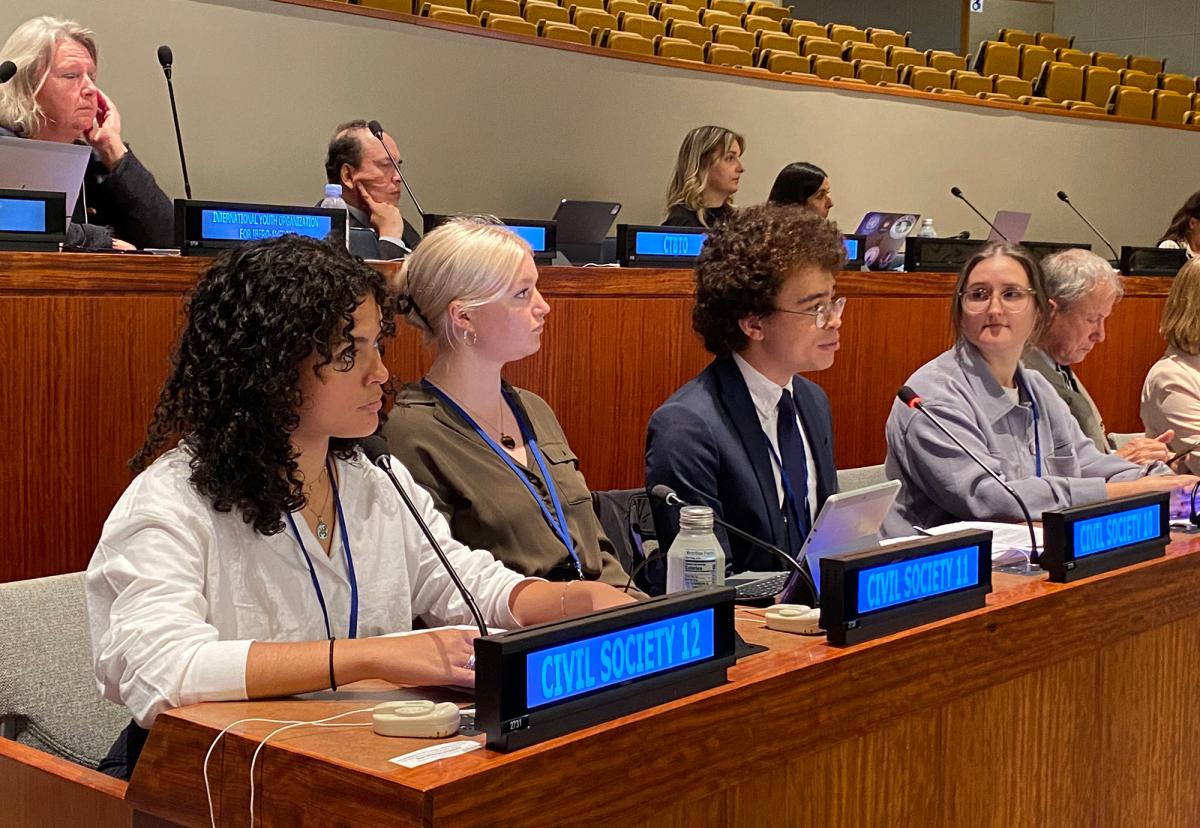
Clay hopes the statement will illustrate his generation's passion in advocating on this topic. He said, "I hope when others read or hear the speech, they take away that youth voices are strong, and they will be heard when it comes to disarmament because we need this current generation and the next to be pushing for not only an end to nuclear weapons, lethal autonomous weapons, but all weapons that in its use stand in direct violation of international humanitarian law."
Hipkins, whose internship placement is with Reaching Critical Will, the disarmament project of the Women’s International League for Peace and Freedom, delivered a statement focused on gender, intersectionality, and disarmament that was co-signed by 17 civil society organizations.
In Hipkins's statement (PDF), she noted that “The patterns of harm caused by weapons and war, the diversity of people participating in disarmament processes, and the norms, discourse, and analysis of militarism” all have gendered implications, adding that “diversity is essential for challenging socially constructed norms about identity that impact the approach of diplomats, activists, and academics to weapons and militarism.”
Speaking at the UN was particularly meaningful on a personal level for Hipkins, who said, "When I first moved to New York City, my family and I stayed at the hotel across the street from the UN. You could see the Secretariat building from the window of our room. I’d always dreamed of working at the UN in some capacity, and so being able to deliver a statement with fellow Pace students at my side, especially in my last semester, felt like a really full circle moment for me."
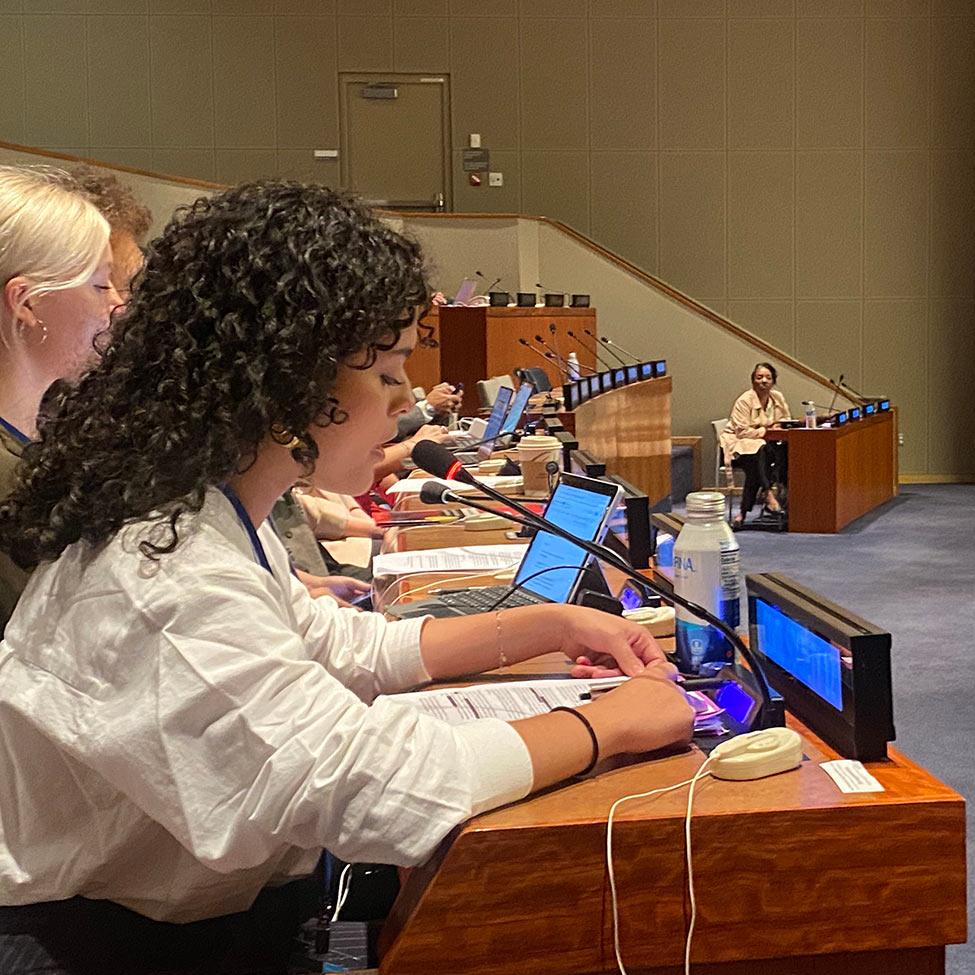
Cintrón Soto's statement (PDF) focused on the “use of cyberspace for peaceful purposes.” Speaking on behalf of ICT4Peace and eight other organizations, she emphasized, “The Internet and connected devices are being weaponized in ways that negatively impact on human rights, such as through surveillance, hacking, censorship, and intentional disruption of internet services and access.”
On the experience, Cintrón Soto said, "Being a student meant representing the dreams and voices of my peers, advocating for transparency and change. As a Latina, I emphasized the importance of diverse voices in shaping a more inclusive and equitable world. Ultimately, I look forward to seeing more strong and powerful Pace students use opportunities like these to amplify their voice and know that meaningful change is possible."
Pace students speaking at the United Nations has become a mainstay in the Political Science and Peace and Justice Studies programs, providing students real-life opportunities to advocate on globally significant issues. Additionally, The International Disarmament Institute, co-directed by Bolton and Welty, is becoming a space of world-class education and research, and plays a convening role in support of disarmament policymaking, from humanitarian, human rights and environmental perspectives. Pace’s contributions to promoting the involvement of young people in disarmament forums were featured in a report this year by the UN Secretary-General.
More from Pace
A record-number 30 Pace University students have been accepted into the 2023 class of the United Nations Academic Impact and Millennium Campus Network Fellowship Program, the University today announced.
As recipients of a 2022 Dyson Summer Research Award, Dante Dallago ’24, Directing and Peace and Justice Studies, and Kalina Walaski ’24, Acting and Peace and Justice Studies, collaborated on “Happy Holidays,” an investigative theater performance piece exploring the dynamics of the holiday dinner table from the perspective of Gen Z students.
On Thursday, October 13, 2022, Molly Rosaaen ’22, Political Science delivered a statement, drafted by Dyson College students, to the United Nations General Assembly First Committee.
Haub Law’s Trial Team Finishes Big at Hofstra’s 2023 National Medical-Legal Trial Competition
Congratulations to Haub Law’s trial team for finishing as semi-finalists at the 2023 Maurice A. Deane School of Law at Hofstra University and the Donald and Barbara Zucker School of Medicine at Hofstra/Northwell National Medical-Legal Trial Competition held October 6-8th.
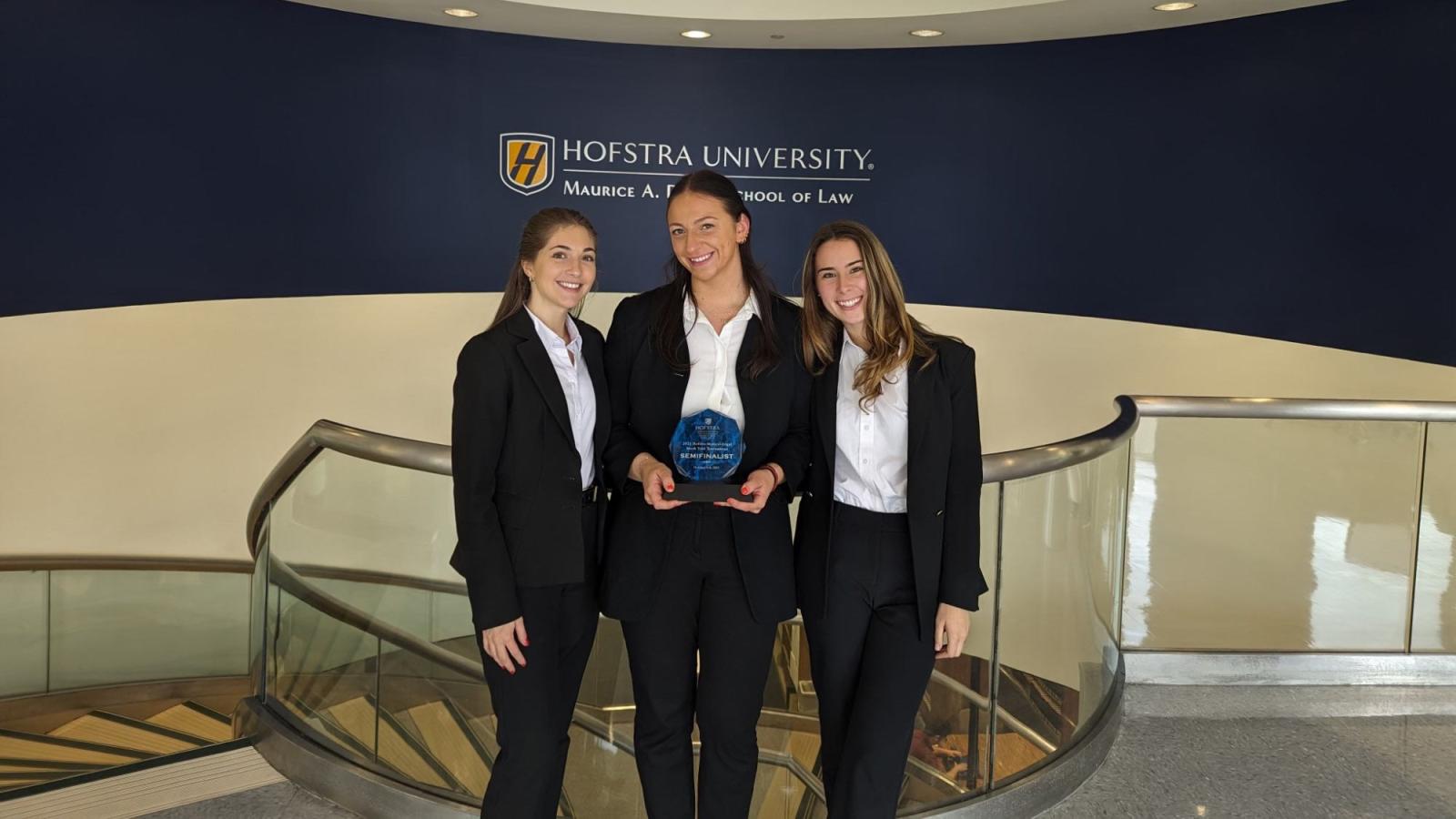
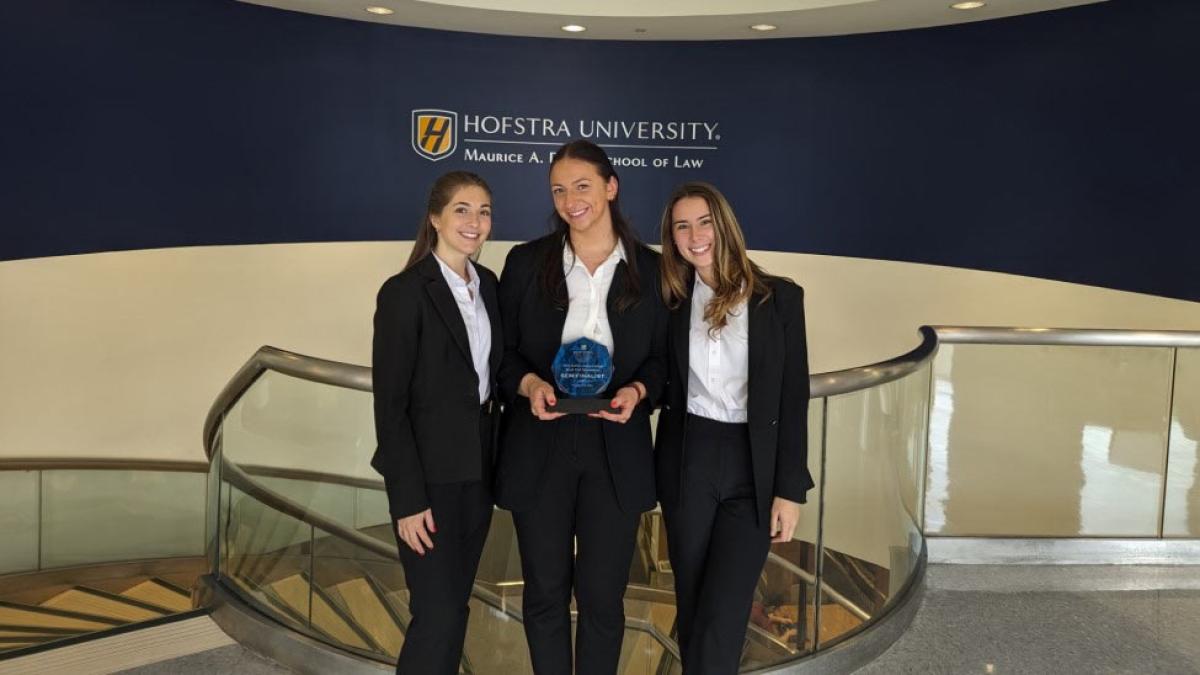
Congratulations to Haub Law’s trial team for finishing as semi-finalists at the 2023 Maurice A. Deane School of Law at Hofstra University and the Donald and Barbara Zucker School of Medicine at Hofstra/Northwell National Medical-Legal Trial Competition held October 6-8th. With 20 schools competing in this year's Competition, Haub Law placed in the top four teams of this competition. During the semi-final round, our defense team put on a phenomenal case, but ultimately lost to University of Illinois Urbana-Champaign who went on to win the entire competition. Hofstra’s Medical-Legal Trial Competition is the only trial competition in the country where a medical school and a law school collaborate to simulate real-life expert testimony by doctors.
Alexandra Stata (3L), Arianna Cruickshank(3L), and Katerina Balukas(2L) competed alongside their coaches Bianca Mayard Francois and Alexis Epstein. Alexandra Stata took on both sides of the trial, competing as the Plaintiff with Arianna Cruickshank, and the Defense with Katerina Balukas. “This is my second time competing in this competition and the preparation is extremely difficult,” said Alexandra Stata (3L). “Throughout the competition, you continue to learn things that you didn't originally consider with regard to the various medical conditions included in the problem at hand. This makes the competition even more exciting, but tremendously challenging. As challenging as this competition is, it is the closest simulation to real world trial experience you can get and is my favorite competition that I have competed in during my time with the advocacy program.”
Professor of Trial Practice and Director of Haub Law’s Advocacy Programs, Louis Fasulo, believes this competition to be “one of the most competitive mock trial competitions.” “The team advanced through the competition as a result of their great skill-set and solid grit,” said Professor Fasulo. “I am so proud of them for providing us with our best finish in this competition ever.”
Pace University Celebrates Opening of 15 Beekman, a State-of-the-Art New Residence Hall, Academic Space, and Campus Center
With a lobby full of excited students, faculty, staff, and community members, Pace University cut the ribbon to celebrate the official opening of its brand-new building at 15 Beekman.
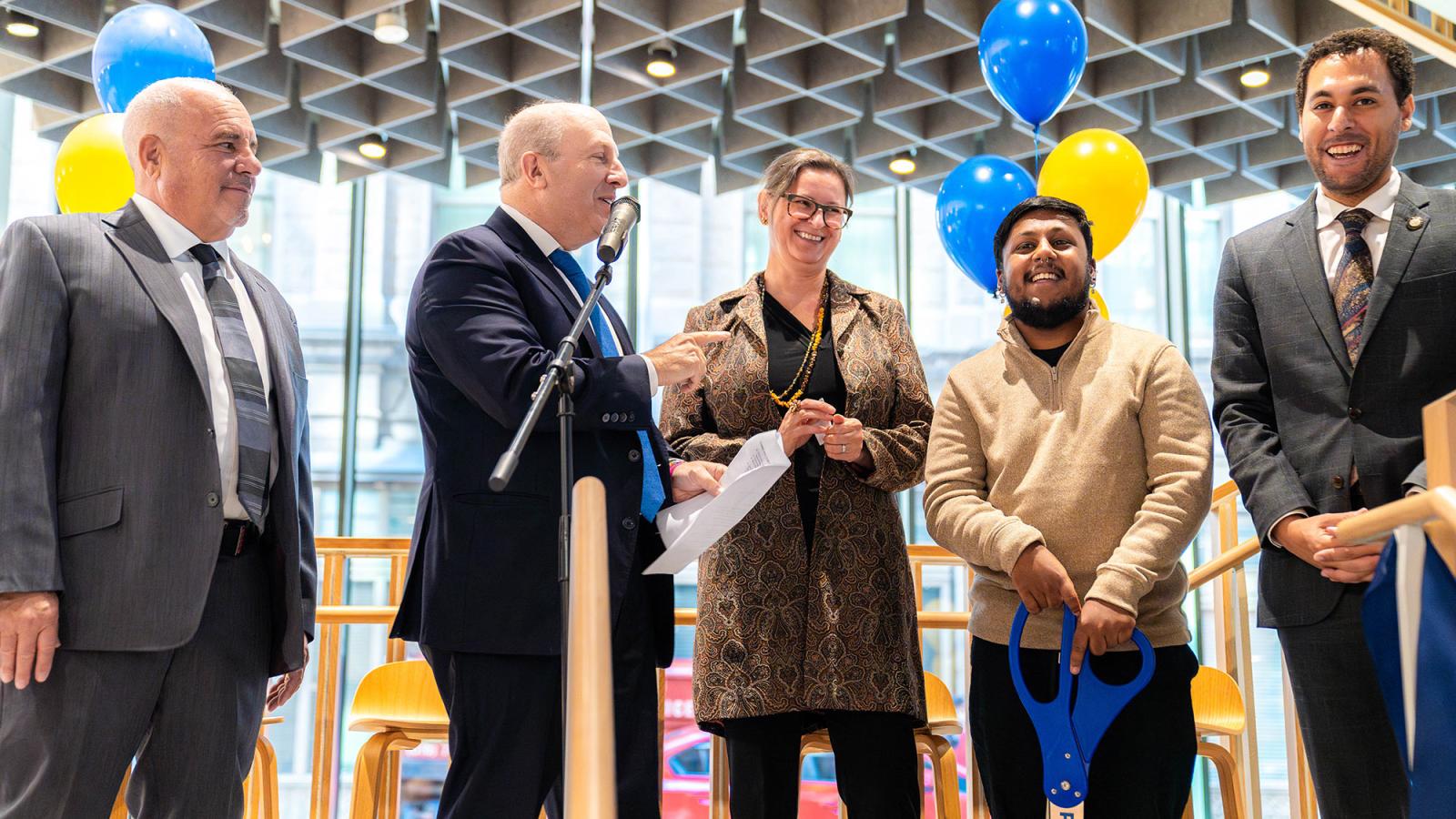
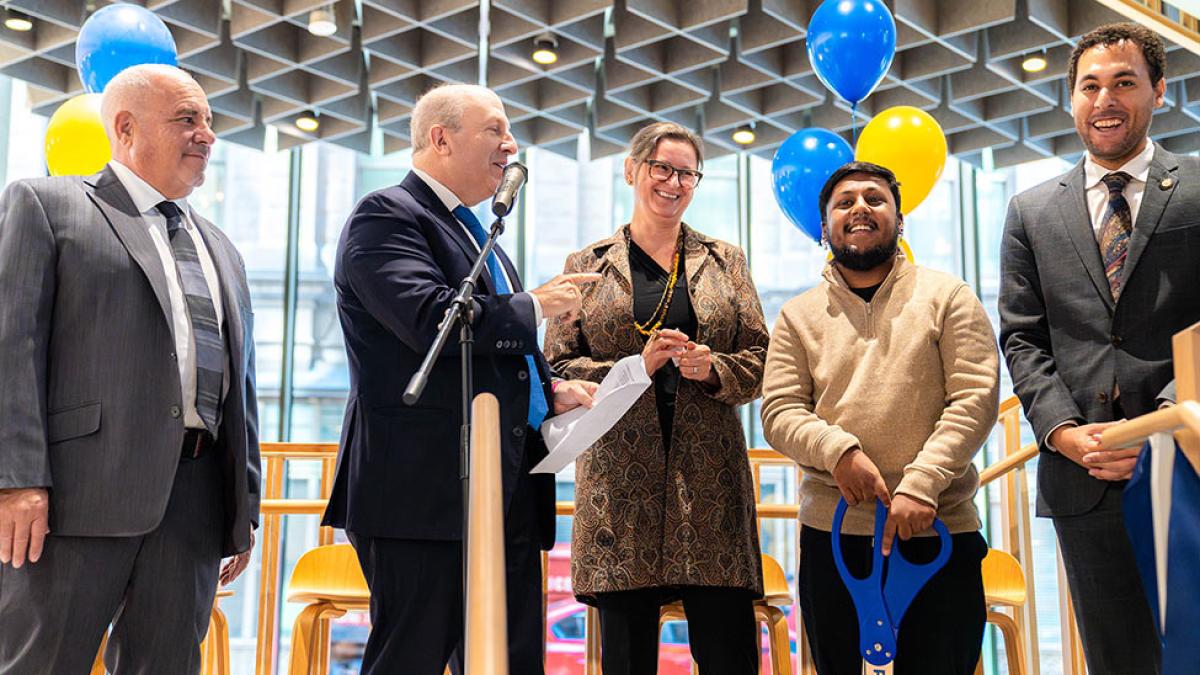
Board Chair Rob Sands and President Marvin Krislov Lead Ribbon-Cutting for 26-Story Mixed-Used Building, Latest Phase of University's Investment in Lower Manhattan Campus
With a lobby full of excited students, faculty, staff, and community members, Pace University cut the ribbon to celebrate the official opening of its brand-new building at 15 Beekman.
15 Beekman is a 26-story mixed use vertical learning hub that represents the next step in the years-long investment that Pace is making in its lower Manhattan campus. At the corner of Beekman and Nassau streets, the building features a residence hall housing nearly 500 students, dining facilities, a state-of-the-art library and learning center, tech-enabled classrooms, and three floors that constitute a dedicated home for the Seidenberg School of Computer Science and Information Systems.
During the ribbon-cutting ceremony, Pace Board Chair Rob Sands, President Marvin Krislov, and New York City Council Member Christopher Marte provided a warm welcome and congratulations to the diverse group in attendance.
President Krislov spoke to students about how the new building is more than just amazing architecture and swaths of natural light and cityscapes—it puts the academic experience at the fore.
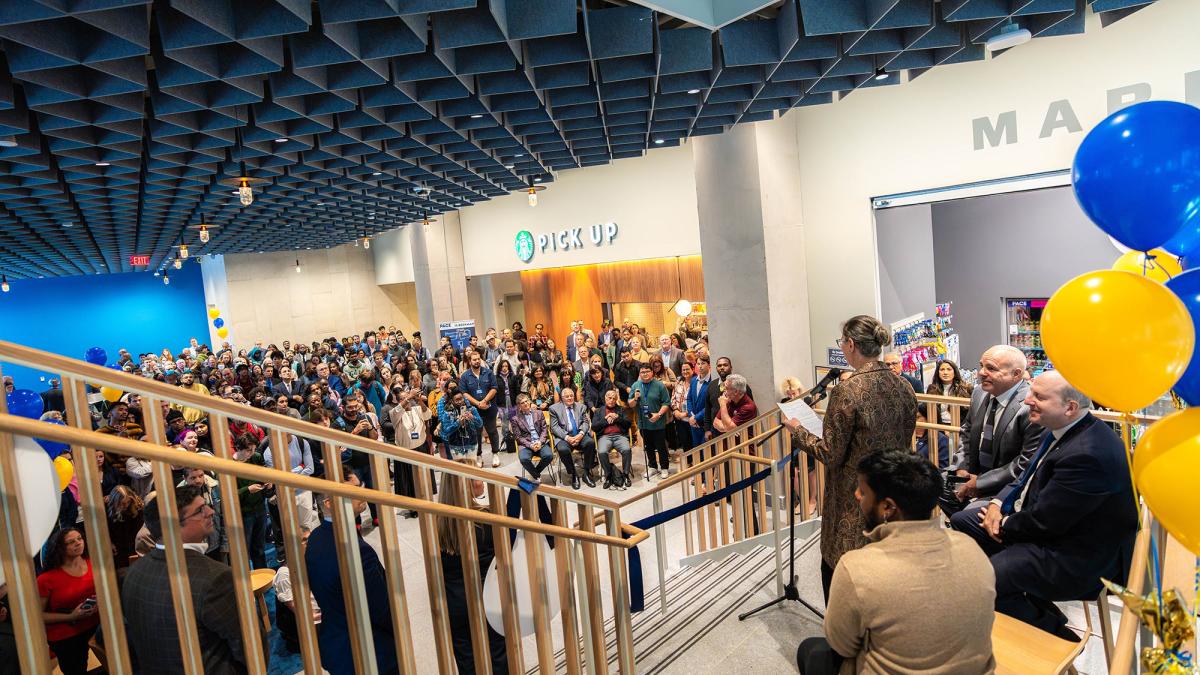
“15 Beekman is part of the amazing transformation of our New York City campus and a symbol of the powerful new future we’re building for Pace University,” President Krislov said in his remarks to the crowd. “We could not be more excited for this new space that will provide even more incredible opportunities for our students, faculty, and staff for decades to come.”
Pace Board Chair Rob Sands connected the investment into 15 Beekman with Pace’s motto of Opportunitas.
“I’m a big believer in Pace University and the work that we do here,” said Chair Sands. “We create opportunities for our students, and we help to change lives. The transformation of this campus is about ensuring that we remain equipped to deliver on that commitment, and this building demonstrates clearly that we’re ready to do that for the 21st century.”
Vice President of Campus Planning and Facilities Ibi Yolas highlighted the collaborative efforts that went into ensuring the successful construction and opening of 15 Beekman.
“I’m grateful to the countless designers, contractors, project managers, and others who made this ribbon cutting possible,” said Vice President Yolas. “15 Beekman is a state-of-the-art facility that combines living and learning. The building establishes a strong public presence and affords access to views and natural light throughout, so it will be an incredible experience for all who use it.”
“Pace University is such a great asset to our downtown community and we are excited to join the opening of 15 Beekman,” said Council Member Marte. “The environment that students learn in is so important to their ability to focus, to relax, to socialize, and to study. This new building exceeds the standards of academic buildings and I am eager to see how it will contribute to Lower Manhattan as a whole.”
NYC Student Government President Aman Islam celebrated the diversity of uses and services that 15 Beekman provides for students here at Pace.
“Seidenberg is one of the hottest schools here at Pace and I am so glad they are getting to move into a gorgeous and innovative space on our campus,” Islam said. “I am also extremely impressed with the design of the building, allowing for academics to be at the forefront of its use as the bottom half of the building while still ensuring epic views for all of our residential students.”
About Pace University
Since 1906, Pace University has been transforming the lives of its diverse students—academically, professionally, and socioeconomically. With campuses in New York City and Westchester County, Pace offers bachelor, master, and doctoral degree programs to 13,600 students in its College of Health Professions, Dyson College of Arts and Sciences, Elisabeth Haub School of Law, Lubin School of Business, Sands College of Performing Arts, School of Education, and Seidenberg School of Computer Science and Information Systems.
Justice, equity, sustainability, and beauty: building a better world with human-centered design
Seidenberg's new faculty member, Jonathan Williams, brings his expertise to the human centered design master's program, where user experience leads technologists, artists, designers, and psychologists to build better, more equitable, and more beautiful things.
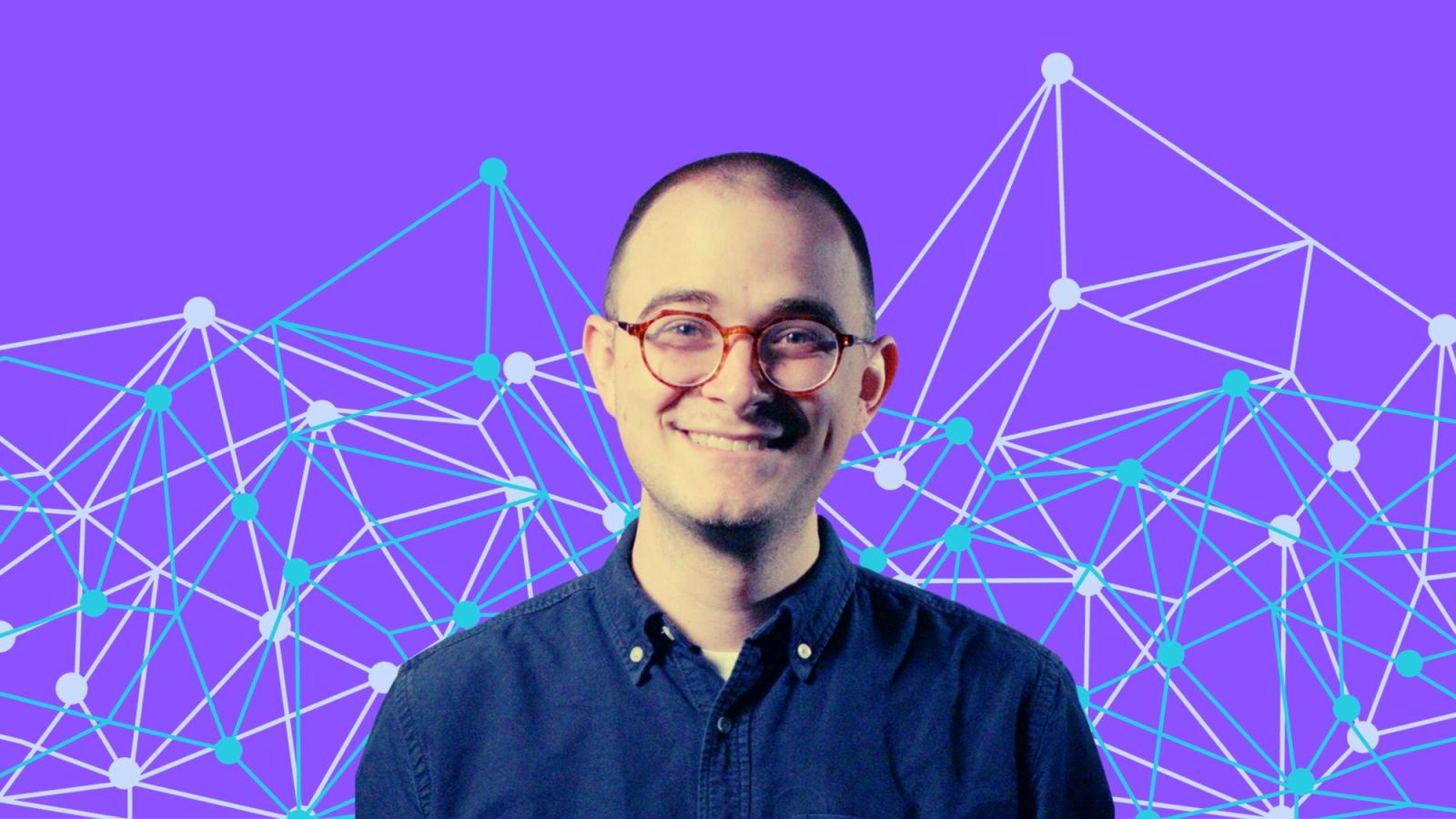
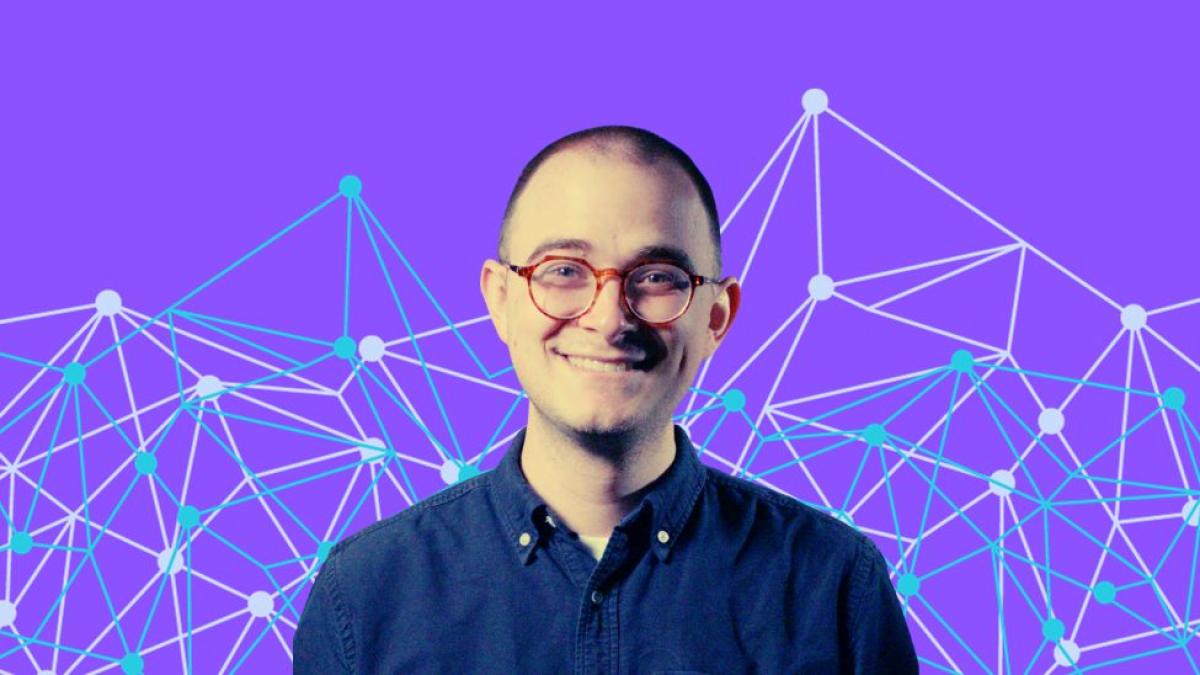
The future is human centered—and new Seidenberg faculty member Jonathan Williams knows it. One of the latest additions to the expert faculty roster teaching in the MS in Human Centered Design, Professor Williams brings his unique background in design, problem solving, and knot tying (yes, knot tying) to draw out the interdisciplinary nature of the program, which blends art, design, and psychology with technology.
We asked Professor Williams to share a little about himself and his fascinating background.
What is your background in terms of research, interests, academic pursuits?
My academic background is interdisciplinary, starting with my undergraduate degree in mathematical statistics. My master's degree is in design strategy and management and my current doctoral work is in the area of design studies with an emphasis on design education. Prior to beginning my teaching career, I spent time in the EdTech industry working on content design and development.
What brought you to Pace University?
Pace’s MS in Human Centered Design is a unique program that captures many of my own interests all in one degree program. The opportunity to teach in a program that takes a design centered approach while also being deeply concerned about technical competence and emerging technologies is a really exciting intellectual community to contribute to.
I believe that design is a process that can create change in the world. Students who are interested in co-creating with me and others to push the world to a future that is more just, sustainable, equitable, and beautiful will find a voice for their ideas in the classroom we create.
How are you finding working at Seidenberg so far? What classes are you teaching and how are they going?
Seidenberg has been an extremely welcoming community to me. My colleagues have been helpful at every turn and students have been engaged and ready to learn.
This semester I am teaching three courses at the graduate level: Introduction to Human Computer Interaction, Foundations of Social & Mobile Technologies, and Social & Collaborative Computing. I have designed all of my courses this semester so that each course focuses on a semester-long group project. Collaborative project-based learning is the core of instructional strategy for this set of courses.
To give you a glimpse into the classes, the Foundations of Social & Mobile Technologies students are developing concepts for mobile sites or applications that make a contribution towards one or more of the United Nations sustainable development goals. Social & Collaborative Computing students are getting ready to start an exercise in ethnographic fieldwork as they embed in social networks and virtual communities, and my Intro to HCI students have just wrapped up a series of mini-research tasks where they were applying concepts in usability research to real-world websites.
Who should take your classes, what should their interest areas be?
Students who are looking to create impact in the world will be right at home in my courses. I believe that design is a process that can create change in the world. Students who are interested in co-creating with me and others to push the world to a future that is more just, sustainable, equitable, and beautiful will find a voice for their ideas in the classroom we create. Interest in design (in the broadest sense of the term) is a great starting point but creative problem solvers should be at the front of the line!
What else are you interested in? Any cool projects you’d like to talk about?
This academic year I am working to wrap up my doctoral studies by writing my dissertation. My dissertation research is looking at how knot tying can be used in instructional settings to teach foundational principles of design to students who are beginning their study of design. As I have explored this topic over the last few years, I’ve become quite interested in physically making knots of all shapes, sizes, and patterns. Design has a unique disciplinary angle that can add to the current literature on knot tying and I am excited to reflect and build on this over the next few months as I write. I can’t wait to share my work once it’s done.
And what else would you like to share?
When I’m not preparing for class or researching, you’re likely to find me at a museum in the city or at the theater. I get lots of inspiration from many great museum collections in the city and the theater never fails to captivate the imagination!
More from Pace
Juan Shan, PhD, an associate professor of computer science in Seidenberg, is focused on applying artificial intelligence and machine learning to analyzing medical imaging
Meet Christelle Scharff, PhD, a computer science expert focusing on the limitations and biases of AI systems. She and her team are tackling the intersection of AI and African fashion to explore the impact of diverse datasets.
Seidenberg Professor Zhan Zhang recently made Pace history by earning grants from both the National Institutes of Health (NIH) and the National Science Foundation (NSF). In his ongoing NSF project, Zhan focused on enabling hands-free data collection and documentation in the field by emergency medical services (EMS) providers with an easy-to-use smart glass application.
Elisabeth Haub School of Law at Pace University Welcomes Two Prominent Members of the Legal Community to its Board of Visitors
The Elisabeth Haub School of Law at Pace University is pleased to announce that two new members have joined its Board of Visitors. The new members are two distinguished Haub Law alumni, Amy F. Divino ’91 and R. Nadine Fontaine ‘94.
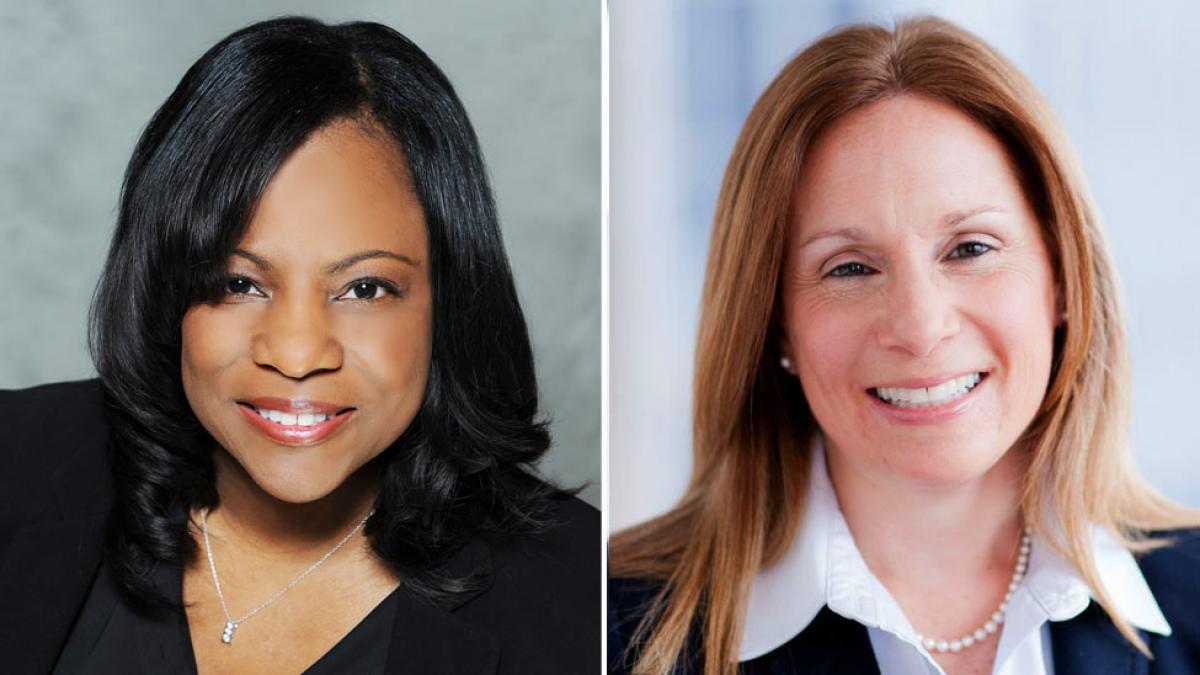
The Elisabeth Haub School of Law at Pace University is pleased to announce that two new members have joined its Board of Visitors. The new members are two distinguished Haub Law alumni, Amy F. Divino ’91 and R. Nadine Fontaine ‘94.
“Haub Law is extremely fortunate to have a Board of Visitors comprised of innovative thought leaders in the legal community,” said Dean Horace E. Anderson Jr. “Both Amy and Nadine are dedicated Haub Law alumni who bring to the Board a broad range of experience. Importantly, they are committed to furthering the best interests of our law school and as members of the Board will do that as both advisors to and advocates for Haub Law. I am proud to welcome Amy and Nadine to the Board and look forward to working with them to ensure the continued success of Haub Law.”
Amy F. Divino ‘91 is a Member of Cozen O’Connor and co-chairs the trademark prosecution group. She has a practice focused on global trademark protection and enforcement in a wide range of fields and transactional matters involving intellectual property. She represents clients in connection with cybersecurity, counterfeiting and domain name infringement matters and other Internet-related issues. In addition to her trademark practice, Ms. Divino handles matters relating to copyright litigation, protection, and enforcement. She is a member of the firm's Pro Bono Committee and Women's Initiative Steering Committee. Ms. Divino graduated with a JD from the Elisabeth Haub School of Law at Pace University in 1991 and a BA from American University. While in law school, she received the American Jurisprudence Award in Products Liability. Prior to entering private practice, Ms. Divino served as a law clerk to the Honorable Lawrence C. Stammelman of the New Jersey Superior Court.
R. Nadine Fontaine ‘94 is General Counsel to the Dormitory Authority of the State of New York (DASNY), a statewide construction and financing public authority. As DASNY’s Chief Legal Officer, Ms. Fontaine is responsible for the management and oversight of all activities of the DASNY’s Counsel’s Office, including oversight of the Office of Professional Integrity, Office of Diversity & Inclusion, and the FOIL, Ethics, and the Real Property Divisions. She has over 29 years of combined legal experience, including litigation of complex commercial and product liability matters in both state and federal courts while in private practice, and extensive government experience. Ms. Fontaine previously served as First Assistant Counsel to the Governor Andrew M. Cuomo, the Assistant Counsel for Economic Development, Public Finance and Procurement, and Assistant Counsel for Human Services. Ms. Fontaine earned a BA degree from Stony Brook University and graduated with a JD from the Elisabeth Haub School of Law at Pace University in 1994.
The Board of Visitors furthers the interests of the Law School by involving alumni and friends in significant issues of concern to the School, and by building a sense of community that fosters pride and participation. The Board is also dedicated to fostering a strong interest in the mission of the Law School by helping to recruit outstanding students, hiring graduates and encouraging financial support from public and private sources. The Board is currently co-chaired by Alfred E. Donnellan '81, Managing Partner, DelBello Donnellan Weingarten Wise & Wiederkehr, LLP and Kathleen Donelli ’85, Partner, Goldschmidt & Genovese, LLP.
EESI Commemorates 40 Years of Climate Action
The Environmental and Energy Study Institute (EESI) highlighted the pioneering leadership of Pace Law Dean Emeritus Richard L. Ottinger in a tribute commemorating 40 years of Climate Action.
Climate Change & the Mysterious Power of Local Land Use Law
The Hudson Independent reports Professor John Nolon recently was a guest speaker at the Irvington Green’s monthly Climate Talk to discuss how the Intergovernmental Panel on Climate Change believes local land use law can be a climate solution.
Professor Bennett Gershman - Podcast
Elisabeth Haub School of Law Professor Bennett Gershman discusses the growing challenges facing prosecutors in the latest episode of A Reasonable Doubt, a podcast hosted by renowned criminal defense lawyer Mark Geragos.
